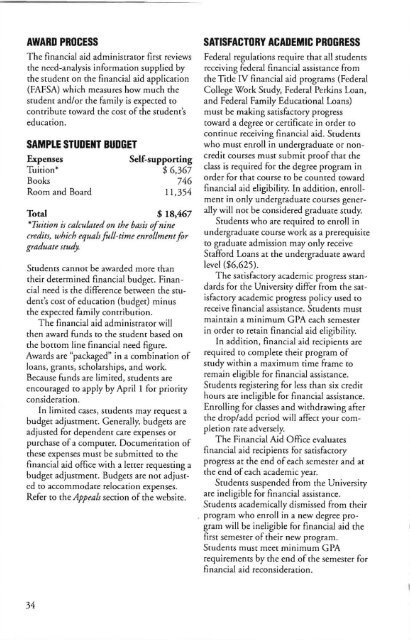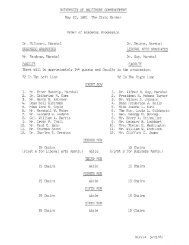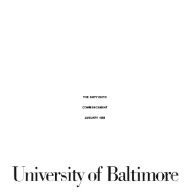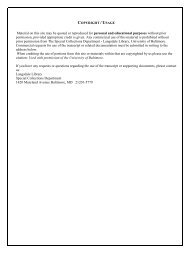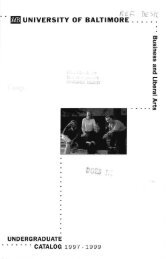2003-2005 - Special Collections - University of Baltimore
2003-2005 - Special Collections - University of Baltimore
2003-2005 - Special Collections - University of Baltimore
Create successful ePaper yourself
Turn your PDF publications into a flip-book with our unique Google optimized e-Paper software.
AWARD PROCESS<br />
The financial aid administrator first reviews<br />
the need-analysis information supplied by<br />
the student on the financial aid application<br />
(FAFSA) which measures how much the<br />
student and/or the family is expected to<br />
contribute toward the cost <strong>of</strong> the student's<br />
education.<br />
SAMPLE STUDENT BUDGET<br />
Expenses Self-supporting<br />
Tuition* $ 6,367<br />
Books 746<br />
Room and Board 11,354<br />
Total $ 18,467<br />
*Tuition is caLculated on the basis <strong>of</strong>nine<br />
credits, which equals foLL-time enroLLmentfor<br />
graduate study.<br />
Students cannot be awarded more than<br />
their determined financial budget. Financial<br />
need is the difference between the student's<br />
cost <strong>of</strong> education (budget) minus<br />
the expected family contribution.<br />
The financial aid administrator will<br />
then award funds to the student based on<br />
the bottom line financial need figure.<br />
Awards are "packaged" in a combination <strong>of</strong><br />
loans, grants, scholarships, and work.<br />
Because funds are limited, students are<br />
encouraged to apply by April 1 for priority<br />
consideration.<br />
In limited cases, students may request a<br />
budget adjustment. Generally, budgets are<br />
adjusted for dependent care expenses or<br />
purchase <strong>of</strong> a computer. Documentation <strong>of</strong><br />
these expenses must be submitted to the<br />
financial aid <strong>of</strong>fice with a letter requesting a<br />
budget adjustment. Budgets are not adjusted<br />
to accommodate relocation expenses.<br />
Refer to the Appeals section <strong>of</strong> the website.<br />
34<br />
SATISFACTORY ACADEMIC PROGRESS<br />
Federal regulations require that all students<br />
receiving federal financial assistance from<br />
the Title IV financial aid programs (Federal<br />
College Work Study, Federal Perkins Loan,<br />
and Federal Family Educational Loans)<br />
must be making satisfactory progress<br />
toward a degree or certificate in order to<br />
continue receiving financial aid. Students<br />
who must enroll in undergraduate or noncredit<br />
courses must submit pro<strong>of</strong> that the<br />
class is required for the degree program in<br />
order for that course to be counted toward<br />
financial aid eligibility. In addition, enrollment<br />
in only undergraduate courses generally<br />
will not be considered graduate study.<br />
Students who are required to enroll in<br />
undergraduate course work as a prerequisite<br />
to graduate admission may only receive<br />
Stafford Loans at the undergraduate award<br />
level ($6,625).<br />
The satisfactory academic progress standards<br />
for the <strong>University</strong> differ from the satisfactory<br />
academic progress policy used to<br />
receive financial assistance. Students must<br />
maintain a minimum GPA each semester<br />
in order ro retain financial aid eligibility.<br />
In addition, financial aid recipients are<br />
required to complete their program <strong>of</strong><br />
study within a maximum time frame to<br />
remain eligible for financial assistance.<br />
Students registering for less than six credit<br />
hours are ineligible for financial assistance.<br />
Enrolling for classes and withdrawing after<br />
the drop/add period will affect your completion<br />
rate adversely.<br />
The Financial Aid Office evaluates<br />
financial aid recipients for satisfactory<br />
progress at the end <strong>of</strong> each semester and at<br />
the end <strong>of</strong> each academic year.<br />
Students suspended from the <strong>University</strong><br />
are ineligible for financial assistance.<br />
Students academically dismissed from their<br />
program who enroll in a new degree program<br />
will be ineligible for financial aid the<br />
first semester <strong>of</strong> their new program.<br />
Students must meet minimum GPA<br />
requirements by the end <strong>of</strong> the semester for<br />
financial aid reconsideration.


